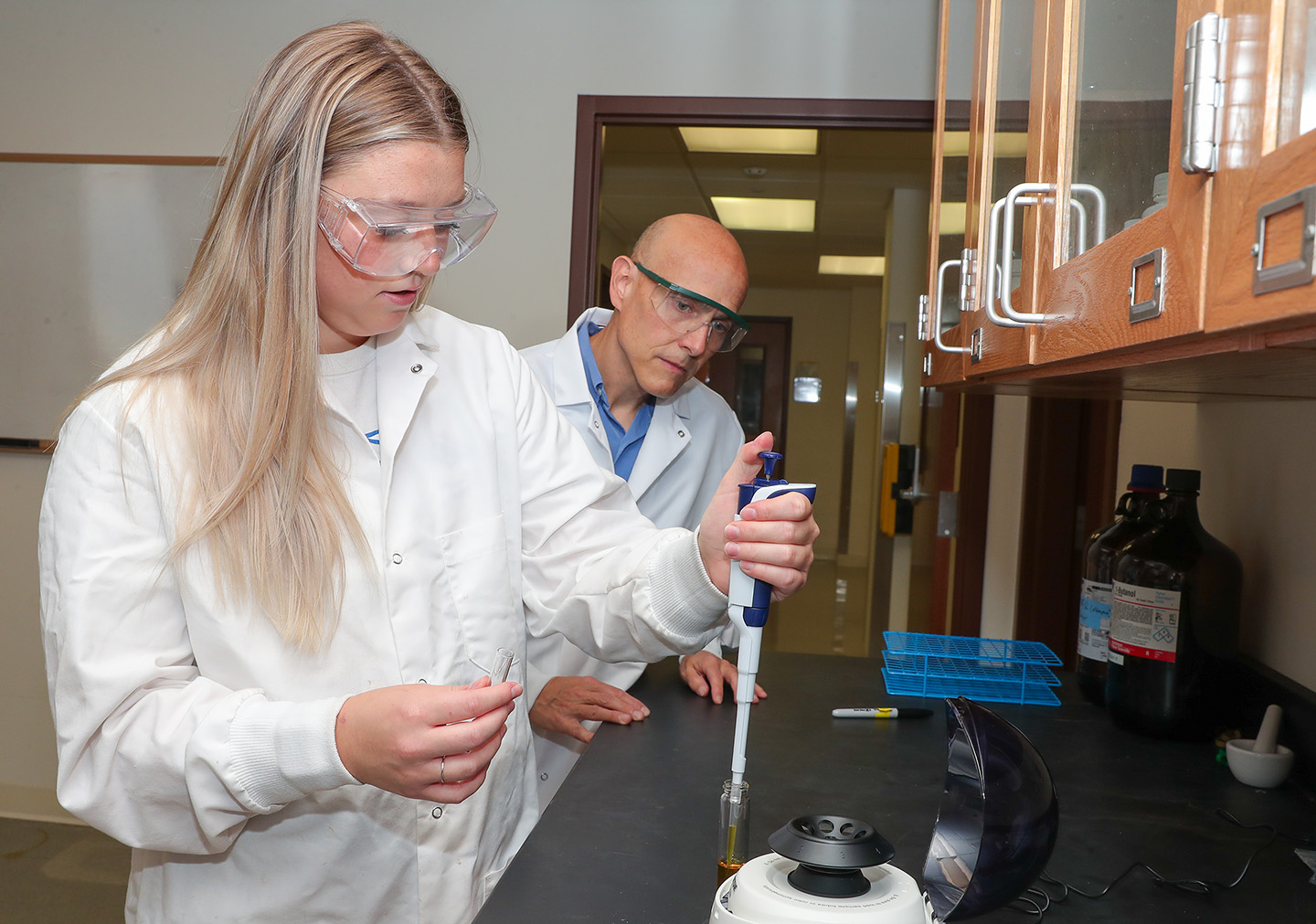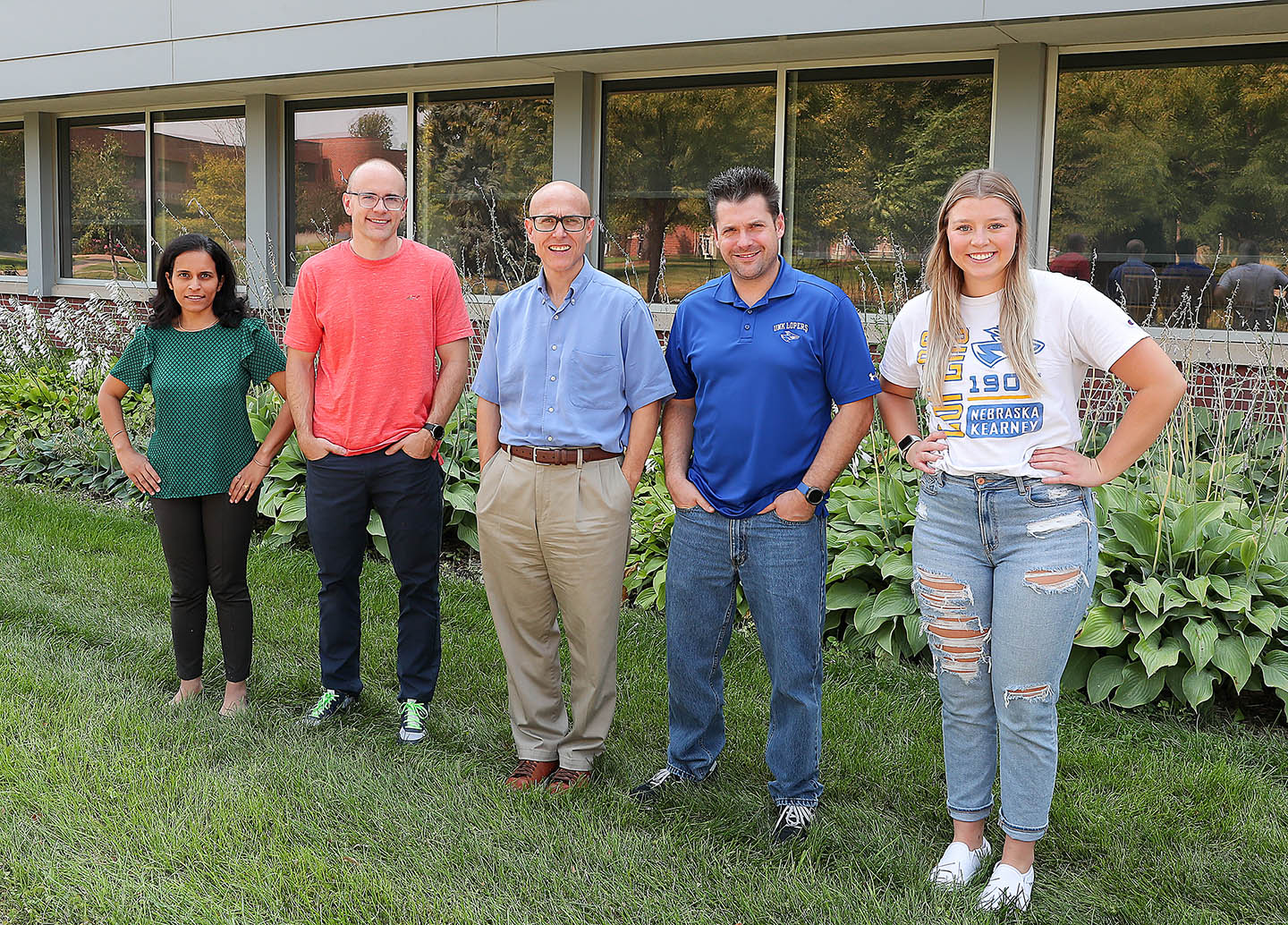
By TYLER ELLYSON
UNK Communications
KEARNEY – Mackenzie Hagemeister came up with the idea three semesters ago, when she first got involved with undergraduate research at the University of Nebraska at Kearney.
The psychobiology major from Arlington was assisting associate chemistry professor Allen Thomas with his cancer research and, at the same time, developing another proposal that would eventually become their next big project.
“I thought all students had to have their own research project, so I was trying to figure out what I was going to do,” said Hagemeister, a senior who graduates in December.
She decided to focus on seasonal affective disorder (SAD), a condition that occurs in regions where there’s less sunlight during certain times of the year. Most common in the fall and winter months, those impacted by SAD experience symptoms such as fatigue and depression.
Searching for answers for her sister, who struggles with the disorder, Hagemeister researched the pineal gland and its connection to the sleep-wake cycle. Located in the brain, the pineal gland helps regulate the body’s circadian rhythm by secreting melatonin, a hormone produced in response to darkness that impacts our internal clocks.
“Melatonin isn’t a well-understood molecule in the brain,” Hagemeister explained. “As a neurotransmitter, its role isn’t very well understood either. And people take melatonin willy-nilly.”
Hagemeister reviewed previously published studies and identified a key enzyme in the melatonin-making process – serotonin N-acetyltransferase (SNAT). The multidisciplinary research team, which includes Thomas and three UNK colleagues – associate chemistry professor Michael Moxley, associate psychology professor Evan Hill and associate biology professor Surabhi Chandra – is now working to develop molecules that can block that enzyme and inhibit melatonin production.
By better understanding its function, researchers could potentially develop a drug to treat SAD and other disorders in which melatonin levels are abnormally high.
The project received funding from Nebraska EPSCoR, supporting two paid undergraduate researchers this summer, and Hagemeister and another student in Thomas’ lab were funded by the UNK Summer Student Research Program to work on the project. A recently awarded $395,000 grant from the National Institutes of Health (NIH) ensures this collaboration between UNK faculty and students will continue for years to come.
“The NIH award is designed primarily for undergraduate institutions like UNK,” Thomas noted. “A big component is student involvement and exposing undergraduates to research.”

Five undergraduate students are currently part of the project, with two of them synthesizing different compounds while others are developing an animal model using zebrafish to test the behavioral effects of the compounds after they have demonstrated activity against the enzyme that makes melatonin.
Hagemeister is working in Hill’s lab, where they set up a monitoring system to track the activity of tiny zebrafish larvae.
“Zebrafish have been shown to have a statistically significant increase in nighttime activity when they have no melatonin production, because you can knock out the gene that produces the enzyme we’re targeting,” Hagemeister said.
“By testing on zebrafish, we’ll be able to tell if the molecules we’re making are having the desired effect,” Thomas added.
Funded through the National Heart, Lung and Blood Institute, the nation’s leader in the prevention and treatment of heart, lung, blood and sleep disorders, the NIH award will support the research project through August 2025. Hagemeister helped write the grant proposal – something no student had done before in Thomas’ eight-plus years at UNK.
“It’s very rare for a student to put forward an idea that becomes the basis of a grant proposal,” he said. “Even at the graduate level it’s probably not common, but at the undergraduate level I would say it’s quite rare. I’ve certainly never heard of it before.”
“I think that speaks to how intelligent Mackenzie is,” Thomas added. “In the physical and natural sciences, it’s really uncommon for students to have that level of involvement, partly because it’s so complicated.”
Hagemeister plans to attend medical school after graduating from UNK. She wants to be a family physician.
“Having this opportunity to conduct research will really benefit my future career as a physician because I’ve learned how to look at a problem and not just think about the things that are already present as treatment options,” she said.
Thomas views her project as a “launching pad” that could spur future circadian rhythm research at UNK. It will certainly lead to a unique opportunity next spring, when Hagemeister and other students involved in the research will visit Harvard Medical School and present their findings to world-class scientist Dr. Philip Cole, a professor of medicine and biological chemistry and molecular pharmacology who is mentoring the UNK team.
“It’s really cool knowing that people outside UNK think an idea I had is worth investigating and worth pursuing,” Hagemeister said. “It’s really validating as a researcher, too. Research is hard and you fail a lot, so having something like this feels like a really big win and reinvigorates my love of research.”